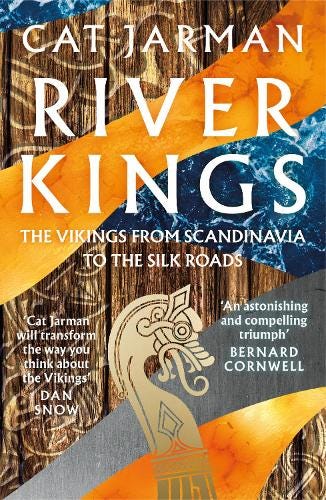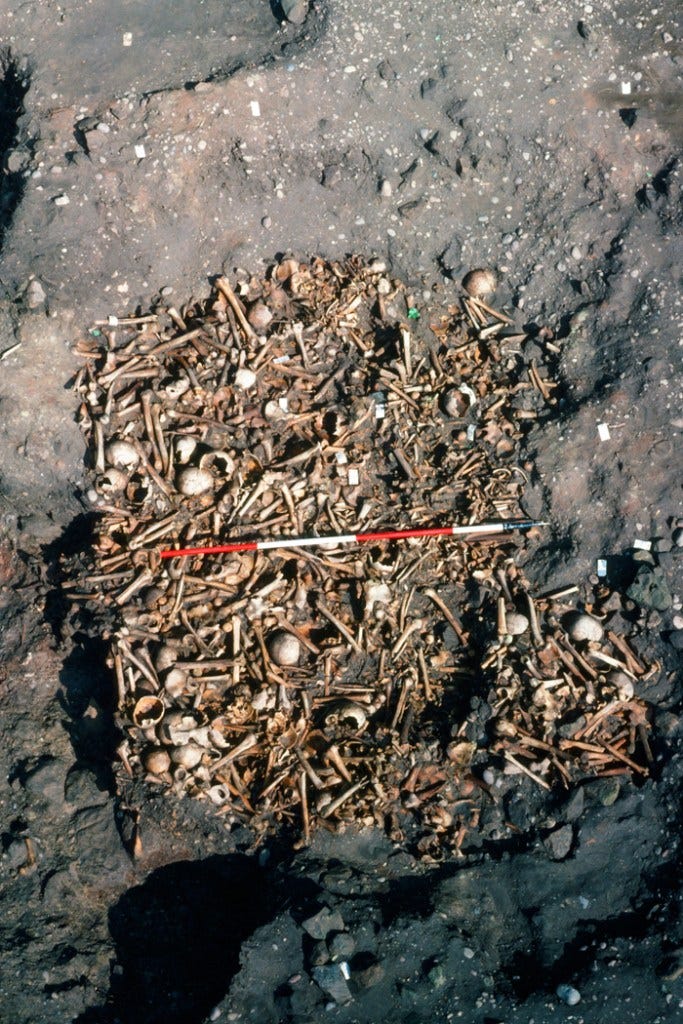January is now complete and so is the inaugural HistFest book club. It was such a pleasure to explore different historical worlds and then chat about them afterwards. Some thoughts on January’s reads…
Cat Jarman’s River Kings explores the vast, and often surprising, cultural networks that shaped the Viking Age. Engagingly written in the first-person, we follow Jarman’s investigation into a single 'Carnelian' bead found during excavations of a Viking burial in Repton, Derbyshire, in the 1980s and revisited by Jarman more recently. The bead serves as a wonderful conduit into the world of the Vikings and takes us from medieval Repton all the way to its place of origin in Gujarat.
There is a lot to love about this book, and I found myself enjoying the scientific analysis enormously. One such tidbit was to do with the carbon dating of the 270+ individuals also discovered at the Repton site.
I hope the scientists among you can forgive this historian’s attempt at ‘sciencesplaining’, but here we go. So, radiocarbon dating focuses on Carbon 14. As the inclusion of number 14 implies, there are a bunch of other carbons that enter the body, but Carbon 14 is important because it degrades when humans and animals die. Meaning, it is possible to measure the passage of time from death to now. The older the remains, the less Carbon 14 within them. But there is a measurement problem. The carbon in the seas is older than in the atmosphere, so fish and other marine creatures absorb a lower level of carbon. This means if a fish and a sheep were to die in, say 793AD, traditional carbon dating could make the fish 400 years older than the sheep, even though they were alive at the same time. The phenomenon, known as the Marine Reservoir Effect, can also confuse the carbon dating of individuals who have consumed a lot of fish.
This variance famously skewed the dating of Richard III’s remains by a few decades initially. It also, as Jarman explores in both River Kings and a 2018 academic paper, presented something of a conundrum for researchers at the Repton burial site, which was mostly made up of adult males. From historical sources to grave goods, everything fit with the remains being those of the individuals associated with the Great Viking Army in 873-874AD. But Radiocarbon dating placed some of their deaths in the seventh and eighth centuries, when the Viking presence in what would come to be England was far less widespread. Jarman conducted isotope analysis of some of the individual’s teeth, which revealed a diet that had a significant concentration of… fish.
It’s a really fascinating read and I found myself wondering why I had decided to become a historian rather than an archaeologist.
January’s fiction book was no less engaging. James by Percival Everett is a retelling of Huckleberry Finn from Jim’s / James’s perspective. For those of you a bit hazy on the original story, James is Huck’s enslaved companion who travels with the young boy along the Mississippi River as they run away from their respective circumstances. It’s an absolutely extraordinary book, with so many layers that I was glad to have the chance to discuss it in a book club forum.
Everett is a master when it comes to playing with language and exploring the power of prejudice and expectation. He also has a razor-sharp ability to present the absurdity of James’s situation as an enslaved man in the pre-civil war America. In many ways, it’s a classic Hero’s Journey, with James re-centred as the hero. But it is also so much more. Everett himself has said that his novel is not a book about slavery, rather ‘a story about people who happen to be slaves’. It grapples with power, acceptance, the difference between rights and freedoms, all the while allowing us to experience James’s growing rage. I will not give away the ending, because I would urge you to read it for yourselves.
This month, we’re travelling to different times and spaces. The nonfiction book is Leah Redmond Chang’s Young Queens, which explores the lives of Catherine De’ Medici, Elizabeth De Valois, and Mary, Queen of Scots. The fiction book is Act of Oblivion by Robert Harris, which follows the hunt for two of the men who signed Charles I’s death warrant in 1649. Details of how to sign up can be found here.











I wrote to @HistFestUK on Twitter 2 days ago but no reply.
I signed up for the book club but unfortunately missed it as my husband wasn't well and I had to care for him. He has cancer so it's often difficult to do everything. I asked if this was recorded and if I may have a copy of the recording? I am signed up for 4 book clubs. Is there a recording please?